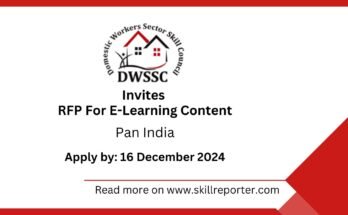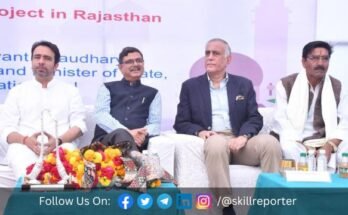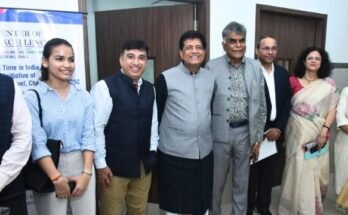In the entire world India stands at the bottom of the list of countries with skilled people. While in South Korea 96% of the population is termed as ‘Skilled’, in India dismal 3% persons are called skilled. Other countries, such as China, Singapore, European countries score much more marks than India in the Skilled persons’ count.
It would be wrong to presume that in India skilled manpower does not exists. Actually, a size-able population in the country is skilled but has never been assessed and certified. The tally of skilled people, thus, shows a dismal 3% when we talk of statistics.
The formal skilling ecosystem in India was quite weak till now. The workers acquire skills either on the job or these skill-sets are transferred by the parents to their children. No formal trainings and assessments are done to formally train people and then certify them after a credible assessment process.
Govt of India has launched many big schemes viz. ‘Make in India’, ‘Digital India’, Swachh Bharat’ etc. However, the foreign investor would be attracted in the country, if sufficient skilled manpower is available in the country. They would not recognize that the existing manpower possesses skills without a credible check of their skill sets.
To overcome this issue, the Govt of India has come up with a very innovative scheme, called ‘Recognition of Prior Learning (RPL)’ scheme. This scheme has been launched in the country under the “Pradhan MantriKaushal Vikas Yojana (PMKVY)’. Under this scheme, the plan is to reach out to 40 Crore existing workers in various sectors till 2022 and after assessing them issue Govt of India’s certification. This is a massive scheme and is implemented by the Ministry of Skill Development and Entrepreneurship under the banner of ‘National Skill Development Corporation (NSDC)’.
This process, in fact, got a big boast when the Hon’ble Prime Minister Shri NarendraModi set up a separate Ministry of Skill Development and Entrepreneurship in Nov, 2014. Till then, this subject used to be handled by Department of Skill under Sports Ministry, which was not sufficient. Another big Boast which the skilling eco system received was the induction of ever energetic and able person to lead this ministry, namely Mr. Rajiv Pratap Rudy. Ever since his taking over this ministry, the skilling eco system has got strengthened by leaps and bounds.
40 Sector Skill Councils (SSCs) have been opened by NSDC in various sectors. The main function of these Sector Skill Councils is to develop National Occupational Standards (NOSs) and then get the skilling trainings conducted thru their affiliated Universities and Trainings Partners and finally assess and certify those students. As the trainings are provided on the State of Art infrastructure and curriculum, as per the exact expectations of the Industry, the students passing out of these institutions immediately get employment.
The RPL scheme is implemented by the Sector Skill Councils by conducting it in formal, as well as informal sectors. In formal sector the SSC identifies specific manufacturing or Service units and 2-3 days orientation programme is conducted at the factory premises itself, before or after the factory timings so that the factory work does not get affected. In the said Orientation programme the Trainer teaches the National standards related to the respective job roles to the employees. E.g. if it is the Sewing Machine Operators in that factory, they would be taught as to what are the National Standards related to the Job role of Sewing Machine Operator. This means that what should be skillsets in a Sewing machine operator as per the National Standards. Thereafter, the workers are mentally prepared to face an assessment process. The accredited Assessor of the SSCs conduct assessment of the workers and then certify them.
In the entire process, special care is observed as the workers may be old and illiterate and would become scared of a formal assessment process. In case a worker is illiterate, his written exam is converted into Viva. This means that the Assessor orally asks questions from him and then a practical exam of his skills is taken. Based on the performance, he is declared pass and is issued with Govt of India’s certificate. In case a worker is not able to pass the entire exam, he is issued with a mark sheet confirming his marks and is encouraged to re appear for the exam after some time after learning the gaps.
In the informal sector the mobilization is done by the SSCs with the help of NGOs and other agencies and the workers are gathered at a camp where the orientation and assessment process is done. E.g. plumbers of a particular area are mobilized at a camp and the process is completed. Or Road side tailors are collected at a camp and the process is completed.
The cost of completion of this RPL process is borne by the Govt of India under the PMKVY scheme. This process brings in a big smile on the faces of the workers as after getting the certification, they would be equipped with a Govt of India’s certificate, which would save them from exploitation and would bring in dignity to them.
In certain industries, this could prove to be a great boon to the entrepreneurs, such as Apparel Industry. Apparel industry is mostly export oriented. The international buyers are very compliance conscious and give orders to the manufacturing units after thorough Compliance audits. In case the manpower of a particular Apparel unit is certified under the RPL scheme, it can prove to be a great differentiator vis a vis others, as the International Buyer would certainly give credence to a ‘Certified unit’ than a general one.
So, the RPL scheme doesn’t only brings smiles on the Worker’s faces, it is equally beneficial for the Entrepreneurs and as the scheme gets popular, more and more entrepreneurs are coming forward to get their units covered under the ambit of RPL scheme.
I myself encouraged manpower of my own factory assessed and certified by Apparel, Made-Up and Home Furnishing Sector Skill Council and I am very happy with the outcome.
SSCs with the NSDC are trying to reach out to 40 crore workers by 2022 in order to make available sufficient certified skilled manpower in the country so that the other schemes get success.
Note: The press release has been shared by Prem Singh, Apparel, made-Ups and Home Furnishing Sector Skill Council



